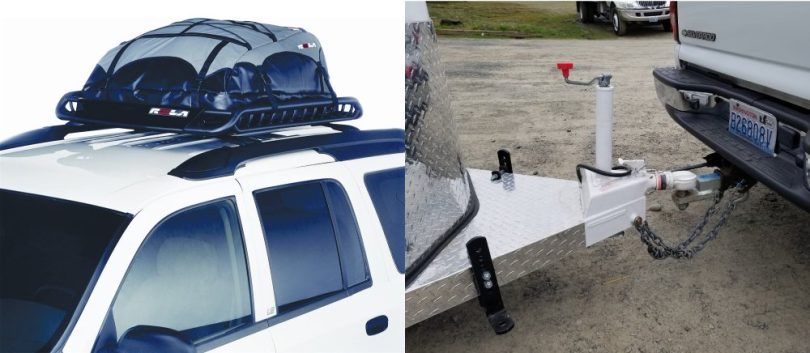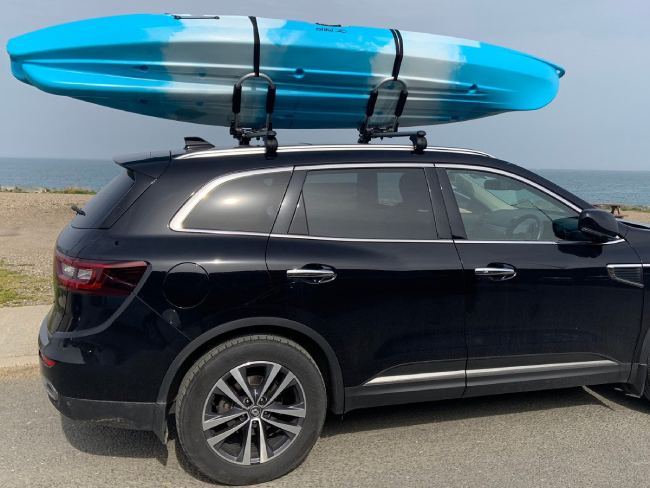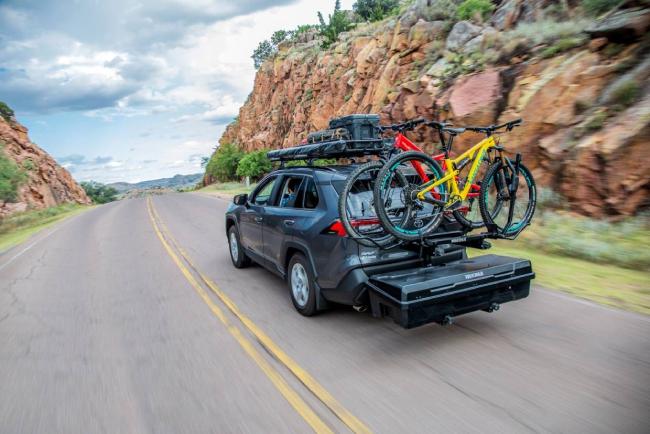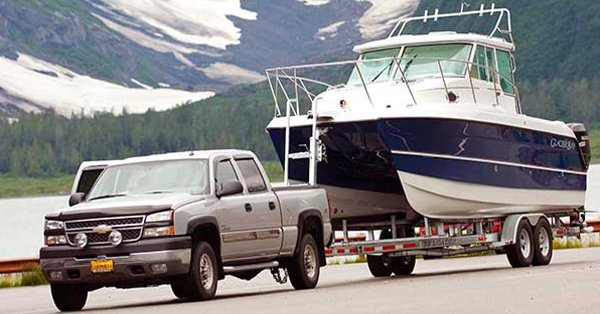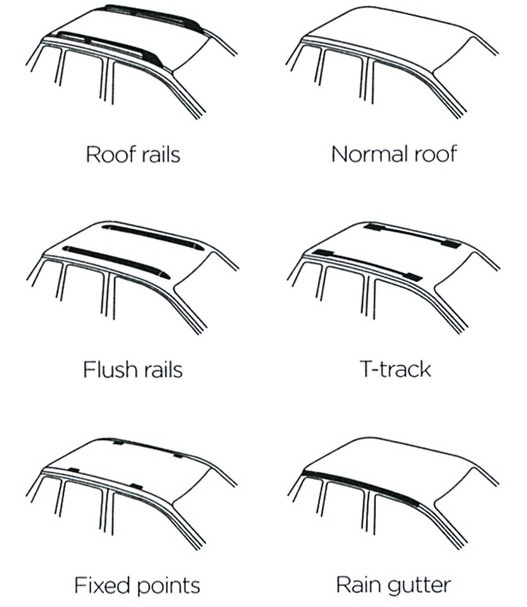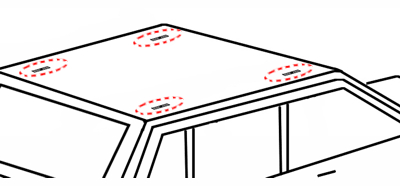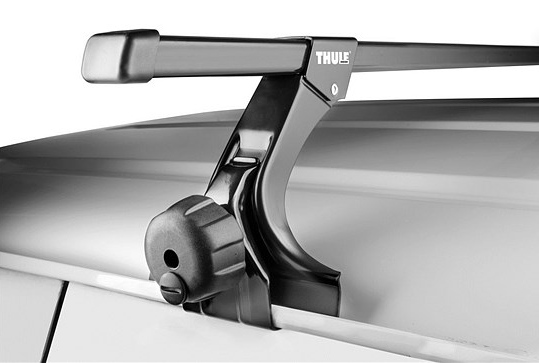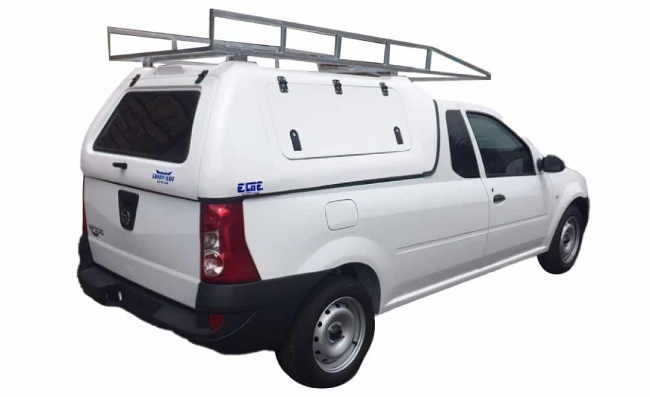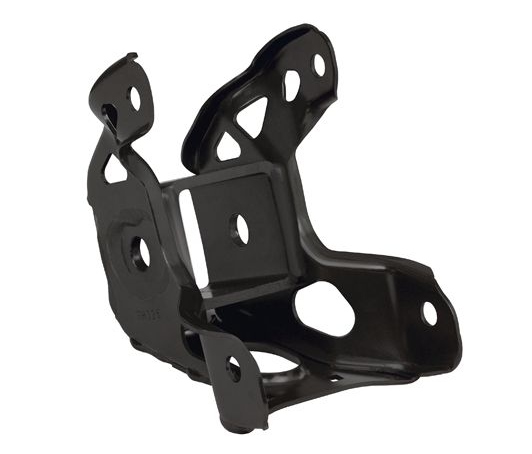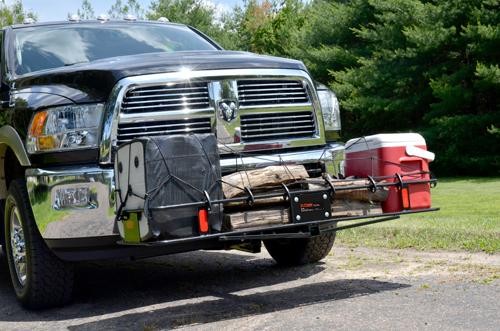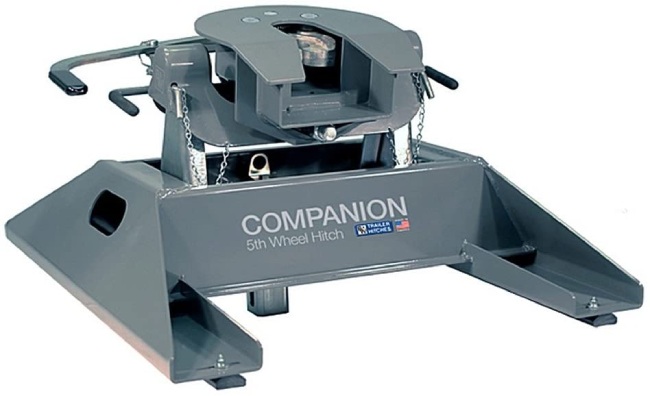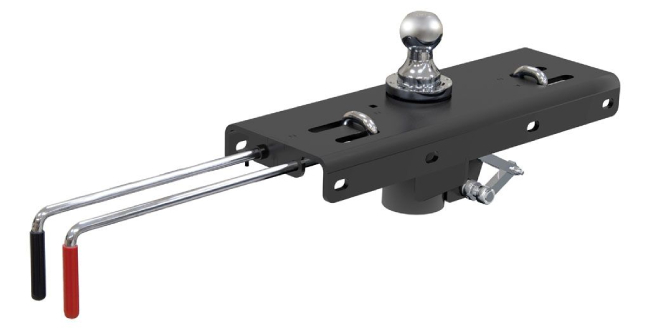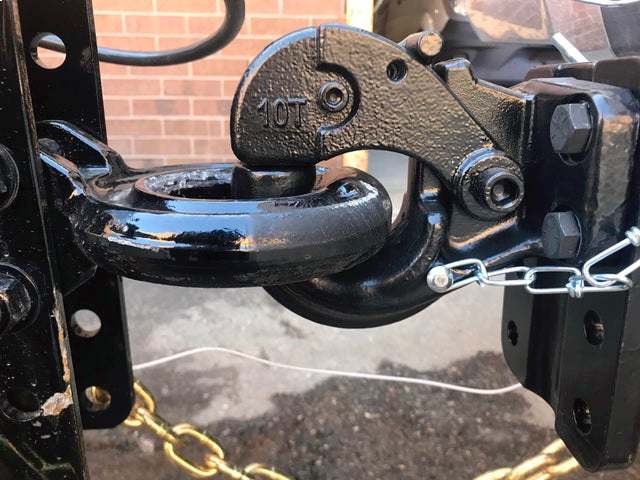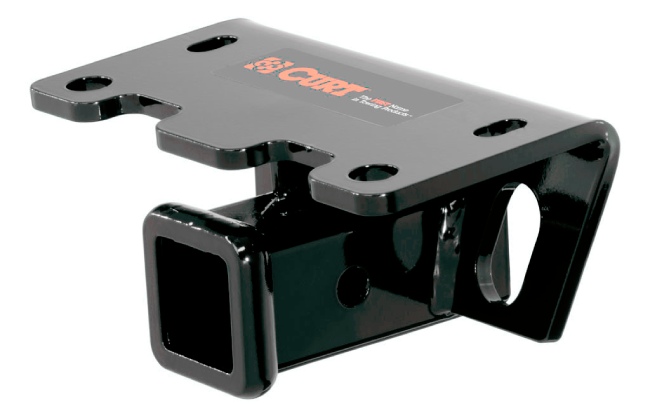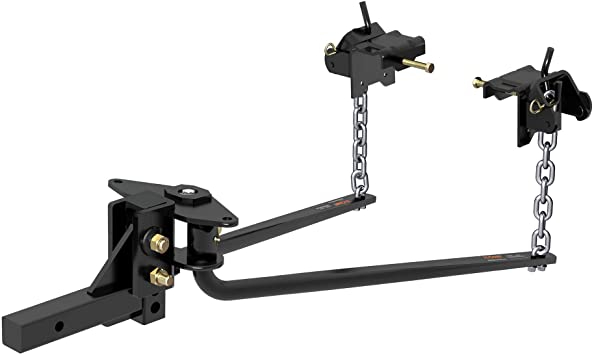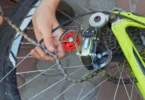When looking for some extra space on your next family vacation or camping trip, you might want to consider adding a roof rack or a trailer hitch to your car. But which one would be best for your needs?
With different types, shapes, sizes, roof racks are versatile while hitches offer more accessibility. Let’s get to know more so you can easily make up your mind!
Roof Rack vs Trailer Hitch
A roof rack can help you carry your luggage, specialized equipment like medical supplies, camping or kayaking gear more efficiently and conveniently.
They can accommodate larger equipment compared to trailer hitches and are stronger than other similar types of storage systems.
On the other hand, you’ve to install a trailer hitch on the rear or front of the car. Designed for domestic use, they are comparatively weaker than a roof rack. But industrial hitches can handle more than 30,000 lbs in some cases.
Major differences and similarities at a glance
| Comparing points | Roof rack | Trailer hitch |
| Carrying power | More | Less |
| Versatility | Highly versatile | Less versatile |
| Stability | Stable | Stable |
| Safety | High | High |
| Locking feature | Present | Present |
| Best for | Kayaking and canoeing | Smaller or heavier objects |
| Types | A lot of types are available | Also available in various types |
| Offers | More versatility | More accessibility |
| Equipment size | Can accommodate larger equipment | Only can accommodate smaller objects (except industrial hitches) |
| Strength | Stronger than hitch | Weaker than roof rack |
| Loading and unloading | Not flexible enough | Flexible |
| Damage risk | Higher | Lower |
| Driving and parking | No problem at all | Troublesome |
| Trunk | Easily accessible | May not be accessible depending on car and hitch types |
| Cameras | Can block backup cameras | Do not block any camera |
| Lifting | Requires less lifting | Requires more lifting |
| Installation | Tough | Easy |
| Low clearance awnings | Can create problems | Do not create any problem |
| Position | On top of the car | Rear side of the car |
Roof rack- Pros
1. Carry more weight than a trailer hitch
You can trust a roof rack for safe transportation. It will hold all your equipment easily, and protect them from falling or getting damaged throughout the journey.
However, Since the roof rack is installed directly over your car, they can usually carry more weight than trailer hitches.
The sturdy construction and secure position means less sway and bounce as you drive and you can carry around 165 lbs of additional weight.
2. Versatile enough to hold any type of cargo
If you have a trailer hitch, you can’t carry larger loads like kayaks, canoes, or bicycles.
On the other hand, a roof rack will let you carry a wide selection of load types.
If you have a roof rack, you won’t have to worry about the type of gear you have. This versatile option will help you carry your luggage that doesn’t fit in your trunk or trailer hitch.
Roof rack-Cons
1. Loading and unloading isn’t flexible
Installing all the equipment over the top of a car can be a big hassle and you may need help, especially for larger items.
Roof racks are challenging in terms of loading and unloading.
2. Damage risk is higher
The risk of damage is higher with a roof rack. There is comparatively less risk of your luggage falling over from a trailer hitch than a roof rack.
Additionally, the added drag of larger objects like kayaks or bicycles can negatively affect your fuel economy, decreasing the performance of your vehicle.
Trailer hitch – Pros
1. Easily accessible
Trailer hitches provide better access to your gears at any time.
Imagine you are heading towards a holiday destination, and you discover a great place or a small village on your way. You may want to explore the village by cycle and you notice it’s loaded on your car’s roof.
Obviously, it’s a lot of work to bring the cycle down and reinstate it once you are done.
On the other hand, the car’s rear is comparatively easier to access.
On top of that, installing a trailer hitch is super easy. Just connect the trailer with the hitch (if you have one installed already) and it’s ready to use.
2. Requires less lifting
Loading and unloading are easier with trailer hitches. Most probably, you’ll be able to do it on your own.
Besides, your goods are comparatively safer in a trailer hitch since the luggage placed on top of your car is prone to scratches from tree branches nearby.
Trailer hitch-Cons
1. Limited capacity
As I’ve mentioned earlier, a trailer hitch can’t hold all types of cargo you may need transporting.
Additionally, trailer hitches can increase the length of your vehicle, which will make urban driving or parallel parking trickier.
2. Can block backup cameras and the accessibility to the trunk
It depends on your car’s model, but most of the car’s trunks are no longer accessible once a trailer is installed in the rear. You’ll also face difficulties using your car’s backup camera once you install a trailer hitch.
If you need to use your trunk or depend on your car’s backup camera frequently, we recommend you go for a roof rack.
3. You need commercial trailers to carry heavier objects
Your regular car trailer can hold less weight than a roof rack. The maximum weight capacity of a standard trailer is 165lbs. Anything that weighs more than that will require commercial trailers.
So, keep note of how much weight you’re carrying.
Similarities between roof racks and trailer hitch
- They both offer locking features so your goods are safe
- Both of them are attached to the car’s frame to provide stability
When to choose a roof rack?
Do you love kayaking and canoeing? If yes, definitely mount a roof rack over your car.
They’ll keep your items safer than trailer hitch. However, be careful about the weight capacity of your roof rack.
When to Choose a trailer hitch?
If you intend to carry your bike or luggage (smaller or heavier objects), install a trailer hitch.
A trailer hitch is the best option for you when you need access to your gear and equipment frequently.
There are also heavy-weight commercial hitches in case you need to carry boats and other big stuff.
Types of Roof racks
1. Naked or bare Roofs
Have you ever noticed a plastic runner on the top of your vehicle? Many people have a misconception that they are decorative pieces. Some even call them “Rain Gutters.”
Made of plastic or fiberglass, they can support both temporary and permanent racks and you’ve the opportunity to attach a rack to those plastic runners.
2. Side Rails
Typically, you will see this type of rack among SUVs, vans, and convertibles. Just like a naked roof, they are also made with plastic or fiberglass.
a) Flush Side rails
The concept of flush side rails is comparatively new, but they are getting increasingly popular in the market day by day.
Flush side rails come with pinholes, so you can attach a shelf if needed.
b) Raised Side rails
They are usually lifted over the roof and different sizes fit different racks.
3. Fixed point and factory track
As the name suggests, the car manufacturers create a set of fixed points in the vehicle’s roof to place a rack.
Installing racks in this position is easier. Metal-built racks provide higher load capacity.
Depending on the size, they can hold up to 300 lbs of weight.
4. Rain gutter
They are sturdy and made of metal to provide durability. They were commonly used among most cars during the 80s.
5. Canopy and camper tops
Do you prefer long vacations in faraway places? Do you have a lot of items to carry?
If the answer to both those questions is yes, Canopy and camper tops are the perfect solution for you.
These metal-made racks are usually installed in large vans and trucks, and they can support heavy loads.
However, canopy and camper tops are expensive and you’ll need expert help to mount them.
Even so, many think they are worth the extra cost because of the quality service they provide.
Types of Trailer Hitches
1. Rear Receiver Hitch
These are the most commonly used hitches that you can attach to the rear frame of your car.
Their weight management capacity is rated number 5 on a scale of 5, where 1 means the lightest and 5 means the heaviest load capacity.
2. Front Mount Hitch
Mount them with the frame on the front side of your car. Once done, you can attach a cargo career or a snowplow, whichever you like.
3. 5th Wheel Hitch
This is a heavy-duty trailer hitch and can hold up to 24,000 lbs of weight. Tie it with the bed of your truck or the rear axle, and you’re good to go.
4. Gooseneck Hitch
These heavy-duty hitches are commonly used for towing large flatbeds, car haulers, and other industrial trailers.
You can trust them with up to 30,000 lbs and they won’t disappoint you.
However, don’t forget to check your vehicle’s weight capacity before purchasing one of these.
5. Pintle Hitch
Now, let us introduce you to a hitch that you will usually find in the construction industry.
Attach the pintle to the truck, the lunette to the trailer, and you are ready for some heavy carrying.
6. Bumper Hitch
They can be attached to the bumper of your car, but can’t carry much weight. Too much load will hamper the bumper and that can’t be pleasant.
7. Weight Distribution Hitch
These hitches stabilize and smoothen your ride by balancing the weight of your goods.
The load on the rear of your truck is transferred to all the axles of the tow conveyance and trailer.
Why you need a car top carrier
- To carry outdoor gears (like a bicycle, a kayak, or a canoe)
- To carry specialized equipment (like medical supplies)
- For commercial and domestic luggage transportation
- To carry the extra load when your trunk is full
Things to consider before purchasing a cargo carrier
- Load bearing capacity, weight, and size of your conveyance
- Accessibility of your roof
- Amount of space you need
- Effects on the fuel economy
FAQs
1. Are rooftop bike racks safe?
Yes, they’re safe to transport your bike. The rack is attached to the tube or fork dropouts of the bike. It creates a strong grip and saves it from falling.
2. Can you open the trunk with a hitch bike rack?
Yes. You can open the trunk with a hitch bike rack. However, it will depend on your vehicle and the position of the hitch.
3. Do roof racks damage your car?
Generally, the answer is ‘no’ if the rack is properly fitted. The answer can be ‘yes’ for an unfitted, overloaded, over-torqued, or under-torqued roof rack.
4. Do roof racks affect performance?
Yes, roof racks affect performance as well as fuel economy and car handling because of the higher center of gravity and wind drag.

